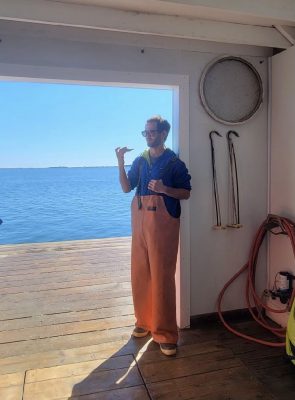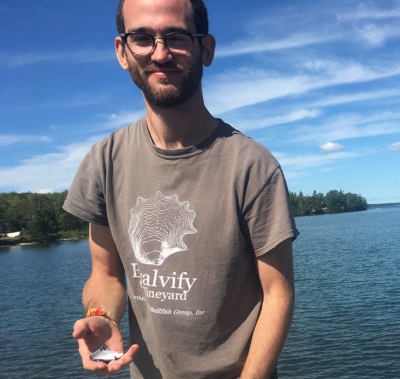
By Judy Benson
Zachary Gordon didn’t start out with aspirations to earn a living in the world of edible bivalves.
Instead, a career in shellfish aquaculture pretty much found him.
The 28-year-old Connecticut native earned his undergraduate degree in environmental science at Skidmore College but wasn’t sure how best to apply it. Wanting to spend the summer after graduation on Martha’s Vineyard, he began looking for a job there.
“A job on an oyster farm was what came up,” he said. “I already had an interest in sustainable food, and my interest really blossomed from there.”
Since that summer six years ago, Gordon has worked on commercial shellfish farms in Maine and Massachusetts, led coastal outreach and education programs in Maine and earned master’s degree in ocean food systems from the University of New England. On the last day at his most recent job as a farm assistant at an oyster farm in Duxbury, MA, he rose at 4 a.m. to be at the shellfish beds at low tide—one of the many real-world experiences that made him an ideal choice to be Connecticut Sea Grant’s regional aquaculture liaison assistant extension educator.
“I’m really excited to bring that to this position,” Gordon said.
That new position that starts Nov. 5 was created with federal grant funds competitively awarded to CT Sea Grant in partnership with the agency officially called the Northeast Fisheries Science Center, specifically its Milford lab. This National Oceanic and Atmospheric Administration research center specializes in shellfish research. Gordon will be based at the lab, but will travel to shellfish farms, research institutions and Sea Grant programs from Maine to Virginia in his role as the human connection between industry, research and academia.
“The purpose is threefold,” said De Guise. “We want to accelerate the transfer of research from the lab to industry. In return he’ll communicate the needs of the aquaculture industry to the Milford lab, so it can be more responsive. And he’ll also interact with academic researchers, to help increase the research capacity for aquaculture.”
Gary Wikfors, chief of the Aquaculture Sustainability Assessment Branch at the Milford lab, said Gordon will be a welcome addition to the staff there.
“We recognize that extension is a profession distinct from research,” Wikfors said. “Our research scientists are eager to benefit from Zach’s role serving as a translator and interpreter—in both directions—so that our studies are better aligned with industry needs and our findings are communicated to our aquaculture constituents in a useful, practical format.”

Gordon stood out as the top candidate for the new position, De Guise said, because he “speaks the language” of shellfish farmers and farming, but also understands the role of extension—the practice of conveying the most current research findings to those who can make use of it to improve their businesses.
“His role is not to tell people what to do, but to share good, science-based information,” De Guise said.
Over the past few years, Gordon said, he met several Sea Grant extension agents and his positive experiences with them led him to decide he would one day like to work for Sea Grant, too. He is already looking forward to introducing shellfish farmers to new technology that would benefit their operations, and to finding ways to help make the permitting process easier.
“And I would like to get industry members and farmers to have a better understanding of the science behind oyster farming and how to create more sustainable operations,” he said.
Judy Benson is the communications coordinator for Connecticut Sea Grant.